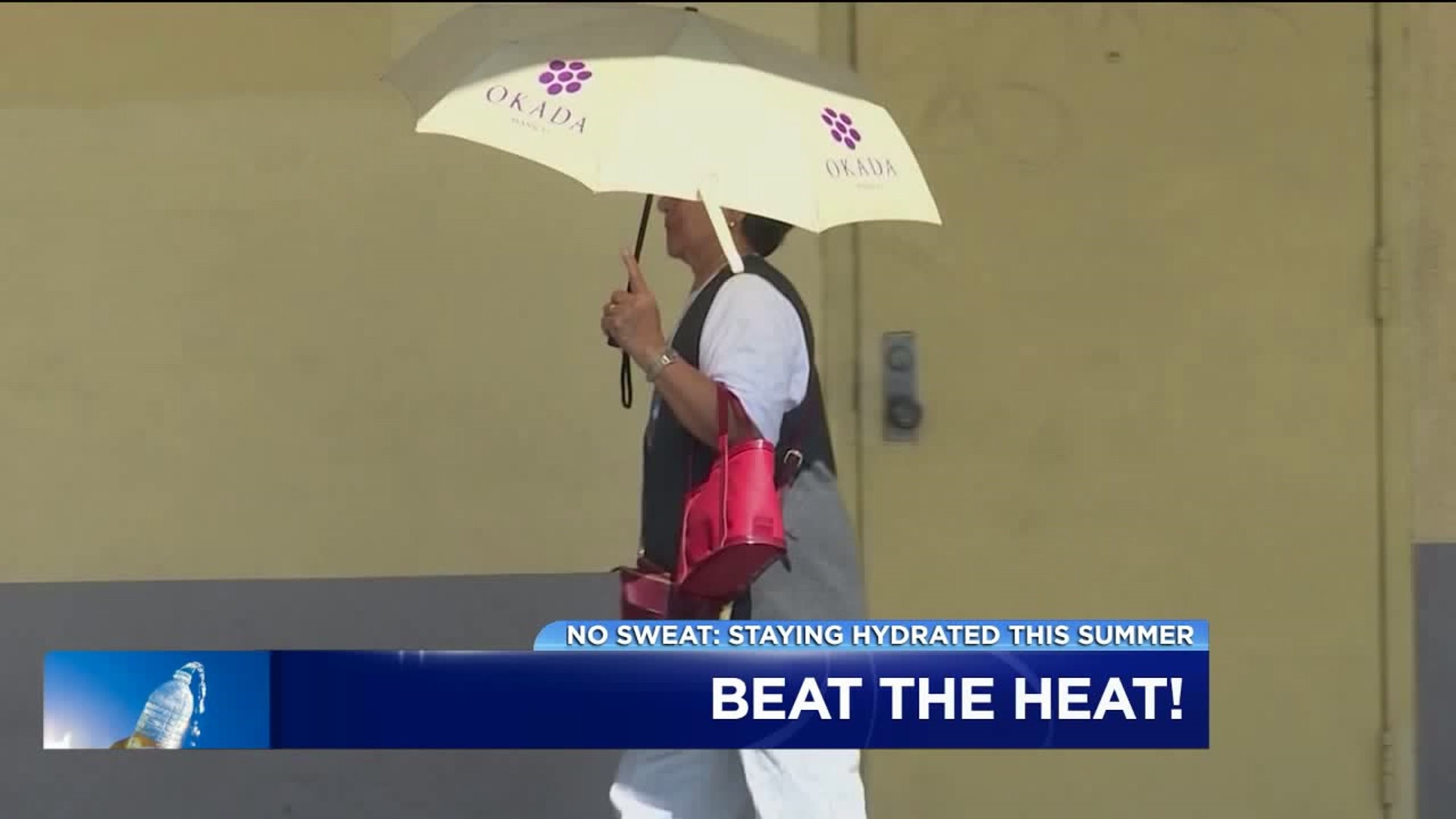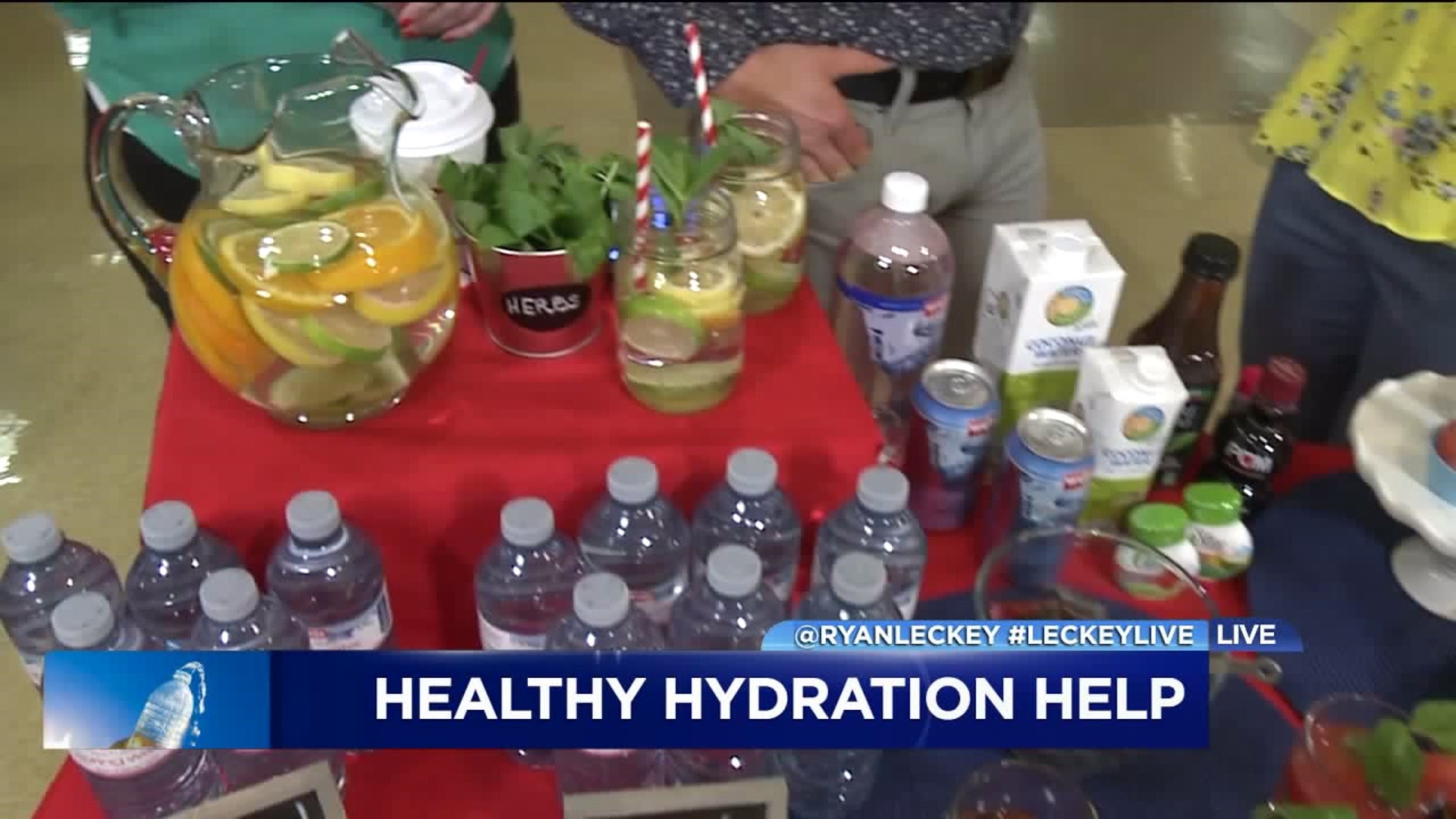This week is expected to be hot and very humid as we near the Fourth of July.
It's the kind of weather that can sometimes lead to dehydration if you're not careful.
To help beat the heat, Newswatch 16's Ryan Leckey turned to Weis Markets' registered dietitians Beth Stark and Kathyrn Long in Danville.
The pair offered all sorts of tips and tricks for healthy hydration in the warmer months.
Plus, Weis Markets presented Ryan with a $15,000 donation Wednesday morning to WNEP's Ryan's Run 10. To date, Weis Markets has donated $150,000 to Ryan's Run.
The hydration ideas, studies, and recipes that were tackled on Wednesday are all detailed out below.
The following facts and stats are all courtesy of Weis Markets' dietitians:
As the temperature rises this summer, drinking enough water is more important than ever to stay hydrated and energized. Even mild dehydration can cause dizziness, tiredness, and headaches.
According to Harvard, more than half of all children and adolescents in the U.S. are not getting enough water, and adults aren’t doing much better.(1)
Why do we need water?
Water is a critical nutrient. Every system in your body needs water to function properly including the heart, brain, and muscles. Water also:
- Helps the heart pump blood through the blood vessels to the muscles
- Cushions and protects organs and joints
- Helps the muscles work efficiently
- Regulates body temperature and sweating
- Aids in metabolism
- Transports waste products into and out of cells
Symptoms of Dehydration
Dehydration happens when you lose more fluid than you take in, and your body doesn’t have enough water to perform normal tasks. Dehydration has many side effects including:
- Thirst
- Flushed skin
- Fatigue
- Decreased energy
- Headaches
- Dizzy or light-headed
- Nausea
- Just not feeling good
- Decreased concentration
How much water do we need?
We need to drink water each day to replace what we lose during basic activities, like sweating, breathing, and trips to the restroom.
Myth: You should be drinking eight 8-ounce glasses of water each day.
The amount of water you need depends on many factors: age, gender, activity level, medications, your environment, and many more!
- Children need anywhere from 4-12 cups of water. Closer to 4 cups when they are younger and closer to 12 cups when they are teenagers.
- Adult women need to drink ~9 cups water per day
- Adult men need to drink ~13 cups water per day
- Pregnant and breastfeeding women need more water
Note: Older adults can have a reduced sense of thirst and may also cut back on fluids to reduce the number of times they need to use the restroom leaving them at an increased risk of becoming dehydrated.
Healthy Hydration
Reach for water or other hydrating beverages like seltzer water, infused water (see more below), unsweetened tea, and unsweetened coconut water. Sports drinks with electrolytes may be needed to rehydrate after intense sweating and activity in hot weather. In general, stay away from sugary juice drinks, soda, and alcohol to rehydrate.
Infused Water
If you’re bored with plain water, try infusing it with fresh fruits, veggies, and herbs. Sipping on infused water is a tasty and refreshing way to hydrate healthy this summer without added sugar or artificial flavoring. Here are some tips:
- Prep your add-ins – Be sure to wash all produce and herbs before slicing and dicing.
- Mix it up - Start with a large glass bottle or jar with a lid, add your desired ingredients and fill with cold or room temperature water.
- Let it sit – For best flavor, refrigerate for at least one hour. For a more intense flavor, refrigerate overnight. Some fruits and herbs will infuse more quickly than others. The longer it soaks, the more the flavors are released into the water.
- Change it up – Experiment with sparkling, seltzer or unsweetened coconut water as the base instead of plain old H2O.
Experiment with these combinations or create your own:
- Blueberries + Lime + Mint
- Pineapple + Lemon + Pomegranate
- Raspberries + Lime + Mint
- Cucumber + Lemon + Mint
Coffee is Making a Comeback
It’s commonly thought that coffee is dehydrating. Well, good news coffee drinkers! Research shows that drinking about two cups of coffee each day does not affect hydration status.(4) Coffee also has benefits included improved memory, diabetes prevention, and muscle performance for athletes.
Be Careful with Alcohol
Alcohol is a diuretic, which means more frequent trips to the restroom and that can lead to dehydration. Try these tips when consuming alcohol, especially in the hotter, summer months:
- Drink a glass of water in between each alcoholic beverage
- Reach for a lower alcohol content drink in the summer months
- Make a wine spritzer by combining wine with seltzer or club soda
Make a Mocktail!
Make a fun alcohol-free beverage with these tips:
- Start with a base of sparkling water, seltzer, fruit juice, unsweetened coconut water or club soda.
- Muddle herbs or fruit to add bursts of crisp, fragrant flavors. Try herbs like basil, mint or rosemary and fruits high in antioxidants such as lemons, limes and berries. Use a sturdy muddler, and add a touch of sugar or simple syrup into the mixer to help create more intense flavors.
- Once mixed with your selected juices and/or sodas, strain your drink into a decorative glass. Add a delicious rim of sugar, salt or try more eccentric ingredients like maple syrup, honey or shredded coconut.
- Go crazy with garnishes! Add flair with orange peels, lime wedges, cherries, cucumber strips, pineapple or watermelon slices, blackberries, and more.
Watermelon Agua Fresca Mocktail
Prep: 15 minutes
Makes: 4 (1½ cup) servings
Ingredients:
- 4 cups chopped watermelon
- 1 cup refrigerated unsweetened coconut milk
- 3 Tbsp. granulated sugar
- 3 Tbsp. fresh lime juice
- 2 cups cold water
In a blender, purée watermelon, coconut milk, sugar and lime juice on high until smooth. Strain watermelon mixture through a fine-mesh strainer into a pitcher. Stir in water. Makes about 6 cups. Serve over ice.
Approximate nutritional values per serving: 96 Calories, 1g Fat (1g Saturated), 0mg Cholesterol, 12mg Sodium, 22g Carbohydrates, 1g Fiber, 19g Sugars, 1g Protein
For more mocktail tips check out the July/August edition of HealthyBites magazine at healthybites.weismarkets.com
Get Water from Food
In addition to beverages, we also get water from the foods we eat. Incorporate more of the following foods to boost your hydration:
- All fruits and vegetables especially: cucumber, tomato, celery, strawberry, watermelon, cantaloupe, salad greens, citrus fruits, grapes, pineapple
- Yogurt, milk, cottage cheese
Other Myths and Facts
Myth: Drinking water will keep my skin looking young.
Truth: Drinking water will not prevent wrinkles or other signs of aging. Skin aging is related to genetics, the sun, and environmental factors like pollution.(5)
Myth: If I drink more water, I will lose weight.
Truth: Yes and no. If you are already properly hydrated, drinking more water may not make a difference. If you are consistently dehydrated, drinking more water could help as your metabolism runs most efficiently when you are properly hydrated. Water may help to promote satiety and take the edge off hunger. Additionally, if you are replacing soda and other sugar-sweetened beverages with water, you may see a result because of the reduced calorie consumption.(6)
Myth: I should do a lemon/water fast after a period of time where I ate/drank too much.
Truth: The body is very effective at taking care of itself. Studies show that fasts and extremely low-calorie diets lower metabolism. Once normal eating resumes, any weight loss will be regained. If you are in good health, focus on a balanced diet, adequate water intake, regular exercise, and sufficient sleep to keep your body’s self-cleaning system working properly.(7)
Myth: You can’t drink too much water.
Truth: It’s uncommon, but it is possible to drink too much water. If too much water is consumed and your kidneys can’t excrete the excess water the sodium content in your blood gets diluted, which is a life-threatening condition. It’s also possible to take in too much water if you have certain health conditions like kidney or heart problems, or if you’re taking certain medications that make you retain water. If you have questions, speak with your primary care physician.
Other Consequences of Dehydration
A small study published in 2015 found that mild dehydration caused a significant increase in driving errors when driving for an extended period of time. The magnitude of driving errors committed while dehydrated was similar to that observed after drinking an alcoholic beverage or driving while sleep deprived.(8)
Dehydration and Kidney Stones
The biggest contributing factor of developing painful kidney stones is chronic dehydration. When you don’t get enough water, calcium and other minerals build up in your urine and are harder for your body to filter out. They can form the crystals that makeup kidney and urinary stones. Although rare, more children are developing kidney stones now because of inadequate water intake and consuming too much sodium in their diet.(9)(10)
Strategies to drink more water throughout the day:
- Get a reusable water bottle and make it a goal to refill it 3-4 times a day.
- Try making infused water with flavors you enjoy.
- If you are drinking sugar-sweetened beverages each day, swap one out for a glass of water instead.
- Set reminder to drink on your phone every two hours during the workday.
- Eat your water! Add hydrating fruits and veggies to your meals and snacks.
- Enjoy frozen treats, like the Berry-Granola Frozen Yogurt Bark in the July/August issue of HealthyBites magazine found here: healthybites.weismarkets.com
Other questions?
Contact the Weis Dietitians at weisdietitians@weismarkets.com and join the Weis Dietitians facebook page: Weis HealthyBites Nourish Your Life
Sources:
- https://www.hsph.harvard.edu/news/press-releases/study-finds-inadequate-hydration-among-u-s-children/
- https://www.ncbi.nlm.nih.gov/pubmed/12376390/
- https://www.ncbi.nlm.nih.gov/pmc/articles/PMC2908954/
- https://academic.oup.com/ajcn/article/103/3/717/4564598
- https://www.ncbi.nlm.nih.gov/pmc/articles/PMC2908954/
- https://www.unm.edu/~lkravitz/Article%20folder/WaterUNM.html
- https://www.health.harvard.edu/staying-healthy/the-dubious-practice-of-detox
- https://www.sciencedirect.com/science/article/pii/S0031938415002358
- https://www.aafp.org/afp/2001/0401/p1329.html
- https://my.clevelandclinic.org/health/diseases/17336-pediatric-kidney-stones



